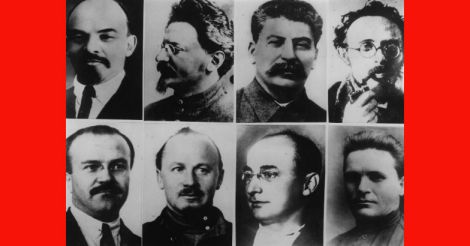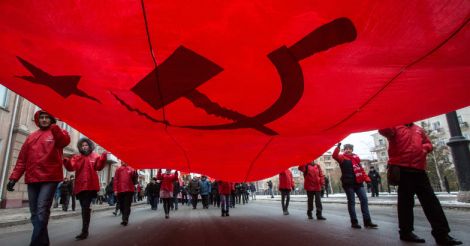The year 2017 is the centenary year of the great October Revolution. An armed insurrection by ordinary men and women - workers, peasants and soldiers succeeded in setting up a workers’ state in a country torn apart by military defeat and food shortage. The valiant attempt of Russian people in the leadership of Bolsheviks to build a socialist state in a country which did not belong to the most developed capitalist world, changed the course of history not just for the people of Russia but for the entire world.
After acquiring state power, the Bolshevik leadership went through years of civil war and war with foreign armies of USA, England, France, etc. In 1922, Union of Soviet Socialist Republic (USSR) came into being. It was the union of Russian republic with other federative Soviet republics of Europe and Central Asia. The initiative to build a socialist world survived for 70 long years. The economic base was changed by nationalizing production and investments. The technological progress, rapid industrialization and enhancement in levels of living surprised everyone. The emergence of the Soviet Union on the world political map galvanized the freedom struggles of erstwhile colonies. Soviet Union made significant contribution in defeating the fascist forces in WWII. Last, but not the least, it posed before the third world a concrete example of how dignified living conditions could be reached to people at large – where every child went to school and every sick person got medical aid.
On 25th December 1991, USSR was dismantled giving independent sovereign rights to the constituent republics. And Russia reverted back to the capitalist world by privatizing the national productive wealth.
The seventy years of existence of Soviet Union on the world map is now a matter of history. However, the transition to a workers' state in Russia, the promise of Bolsheviks to build a socialist society, the strength and weakness of the Soviet socialist society and its impact on world politics needs to be reviewed and documented in utmost sincerity and without preconceived prejudices. The Soviet socialist society might have collapsed but 'socialist project' still remains the only hope for the impoverished and exploited working men and women in this unjust, brutal, chaotic and in the end unsustainable world order created by the capitalist production structure. We need to understand history so that we develop the correct perspective for future directions.
I discuss below some of the salient features of the Soviet experience of building a socialist society:
Socialist Project - a Third world Agenda
In the traditional Marxist frame, evolution of human society into higher stages of civilization was seen in terms of development of productive forces and production relations. Socialist revolution in this frame was the project of proletariat in an advanced capitalist society where productive forces (technological progress) had developed to the maximum possible extent. In advanced capitalist society, proletariat would become a strong enough force to make a break from capitalist production relations and construct a new society where means of production will be owned collectively. Socialist revolution was then expected not in Russia but in Germany and England, where productive forces and capitalist production relations were much more developed and working class was much more organized and politicized.
Russian revolution changed it all. The understanding of revolution as a science was very innovatively modified and creatively applied in Russia. Russia was a less developed country which arrived late into capitalism. Lenin theorized about imperialism as the highest stage of capitalism which linked globally the capitalist countries. This chain could be broken at the weakest link. Therefore, Russia need not wait for the revolution to occur first in Germany.
Worker – Peasant Alliance
However, the proletariat in Russia was small in number and required support from other sections of society to overthrow the exploitative regime of the Czar- Nicholas II. Lenin declared that in Russia, the bourgeoisie was incapable of carrying out even the bourgeois democratic revolution. It would be the proletariat in alliance with peasantry, who would undertake the bourgeois democratic revolution and then move on to socialist revolution.
Worker-peasant alliance was the main fulcrum in successful transition from monarchy of Czar to a Bolshevik state committed to build a socialist society. Following the Russian revolution the socialist project became the Third world project of countries which were less developed and where peasantry played an important role. The less developed countries of Eastern Europe, China, Cuba, Vietnam and Zimbabwe and Mozambique, all joined the socialist block.
The peasantry participated enthusiastically in overthrowing the regime of Czar and that of provisional government of Bourgeoisie in the leadership of Kerensky. First thing after the revolution, the government confiscated the land from landlords and divided it among peasantry to fulfill their main demand. Peasants had petty bourgeois consciousness and no allegiance to the idea of socialized ownership of means of production. It was impossible to build a socialist society without developing socialist consciousness in peasantry. Lenin thought it would be done through formation of cooperatives and that would be a long term project. However, the socialist regime had immediate needs of food grain for the urban population and raw material for industry. An ambitious industrialization plan was chalked out. Obtaining marketable surplus from agriculture turned out to be a Herculean task for the new regime. The peasants' acted recalcitrant repeatedly. In 1927, Stalin declared that solution could not be obtained in framework of individual peasant production. He talked of collectives of small farms belonging to poor peasants.
 The eight greatest personalities of the Bolshevik Party, who all played a role in the Russian Revolution. Top row, left to right, Vladimir Ilyich Lenin (1870 - 1924), Leon Trotsky (1879 - 1940), Joseph Stalin (1879 - 1953) and Karl Radek (1885 - 1939). Bottom row, left to right, Vyacheslav Mikhailovich Molotov, (1890 - 1986), Roucharine; Lavrenti Pavlovich Beria, (1899 - 1953) and Kirov. Getty Images
The eight greatest personalities of the Bolshevik Party, who all played a role in the Russian Revolution. Top row, left to right, Vladimir Ilyich Lenin (1870 - 1924), Leon Trotsky (1879 - 1940), Joseph Stalin (1879 - 1953) and Karl Radek (1885 - 1939). Bottom row, left to right, Vyacheslav Mikhailovich Molotov, (1890 - 1986), Roucharine; Lavrenti Pavlovich Beria, (1899 - 1953) and Kirov. Getty ImagesAt the same time it was decided to reintroduce compulsory procurement from the peasants. The peasants resisted and stopped producing altogether. In November 1929, the central committee took the decision to embark on a nationwide program of collectivization.
The actual collectivization program in 1929-30 and liquidation of Kulaks as a class, has generated a massive literature describing cruelty towards middle and rich peasants and loss of lives in executing collectivization program. Stalin's collectivization program constitutes the darkest chapter in the construction of a socialist society. Using force on alienated peasants was no one’s idea of socialism. The central question remains 'was it necessary to collectivize by force or was there an alternative?'
Freedom to decide the use of surplus politically
As technology develops every production system becomes capable of producing surplus. The system which is comprised of raw materials, machinery, related infrastructure and labor can produce more than what is required for reproducing the system itself. In a capitalist production system, the surplus produced by the system is divided among the capitalists who own the means of production and organize production. It should be noted that in such a system, even an individual capitalist is not free to use the surplus as she or he wants. He must invest it to earn more profits [surplus]. Further, he must invest it in the sector which promises maximum profit. Otherwise he will be dealt out of the system. Thus proceeds the accumulation in a capitalist system under the dictatorship of market.
Paul Sweezy, the Marxist economist from USA analyzed the post revolutionary societies succinctly. A special characteristic of these economies pointed out by him was that these 'socialist economies in making' had attained freedom from the dictatorship of markets. Having nationalized all production resources, the surplus generated by the system belonged to the society as a whole. Each and every individual had his/her claim on it. In other words the system had the freedom to decide the use of surplus politically. This was no small achievement.
It is a different matter that the Soviet Union could not make best possible use of this freedom. There were military compulsions and Soviet Union entered into a race with USA to build up nuclear stockpile. It did not choose technology which was environment friendly. It did not really succeed in defining a new path of industrialization etc, etc. But the fact that political decisions on use of surplus were not optimal should not make us underestimate the momentousness of attaining freedom from the dictatorship of markets. One needs to work on the political superstructure of a socialist society so that optimal decisions can be made and people’s participation can be ascertained. Political freedom to decide the use of surplus distinctly places a socialist economy on a higher plane of development.
Right to dignified livelihood, democratic freedom and developing socialist consciousness
The political freedom to use the surplus of the economy enabled the socialist leadership to provide basic necessities for dignified living to every citizen. This was reflected in increase in life expectancy, the educational levels of population, participation of women in work place, progress in science and technology, the performance of socialist countries in international sports etc.
However, fulfillment of basic needs is not the society imagined by Marx and Engels. Marx and Engels had imagined a society representing the highest stage of development for humanity where every member can develop and use his/her potential to the fullest possible extent. The new society would be an association in which free development of each is the condition for free development of all. A society where everyone will give according to his capability and everyone will get according to his need. A society where democracy will be deep rooted in the true sense.
It cannot be denied that the soviet society did not succeed in making any progress towards the societal form imagined by Marx and Engels. In fact, in ‘Critique of the Gotha Programme’ Marx himself has said that the communist [socialist] society as it emerges from capitalist society is in every respect economically, morally and intellectually still stamped with the birthmarks of the old society from whose womb it emerges.
By changing the economic base one cannot ensure that the birthmarks of the old society will fade on its own. Especially, given the fact that world socialist revolution did not follow the Russian revolution and Russia took upon the responsibility of building one country socialism and was surrounded by hostile capitalist world with more developed productive forces made things extremely complex. Creating a socialist human being has remained a preoccupation of leaders throughout the socialist world from Lenin to Mao to Che Guevara. It remains an incomplete exercise till date.
In the absence of socialist consciousness the democratic freedom of the capitalist world was also denied to the socialist world. Many socialist thinkers consider this as the ultimate cause of collapse of socialist world.
Crisis in the Neoliberal capitalist world and socialist agenda
As I mentioned in the beginning, the fall of Berlin wall and collapse of Soviet type socialist societies does not mean 'End of History' as spelt out by Francis Fukuyama, an American political scientist in 1992. When Cuban President Fidel Castro was asked in 1992 that Socialism has failed everywhere and will Cuba also change its path, he answered that correctness of the path is not to be decided by its success or failure. History has given Cubans the responsibility to carry forward the gains of socialist revolution and we are committed to do so. Then Venezuelan President Hugo Chavez talked of 21st century socialism. Socialism still remains the agenda for working people in the third world.
The financial crisis which occurred in 2008 has affected real economies of USA and Europe engendering recession, unemployment and political unrest. Finally the impact is visible also on the fast growing Indian and Chinese economies. The experts are thinking that the world economy will not be able to get out recession in the normal course – not even through creation of another bubble of finance. In such situation, the capitalist world has handled the crisis by waging wars and restored profit accumulation at the cost of millions of human lives. Already since 9/11 on the pretext of war against terrorism so many countries from Afghanistan and Iraq to Libya and Syria have been destroyed. Now that extreme right wing leadership is taking over USA and Europe, the extent to which warfare will escalate is beyond imagination. Humankind must rise together and say 'no' to this barbaric solution.
The indiscriminate profit accumulation has resulted in environmental crisis which threatens the very existence of this planet. Humankind has to rise together and save this planet.
The only way to do so is to dismantle the dictatorship of markets and profit accumulation. To enumerate human needs on a different plane. This requires an alternative system of production relations. It is ironic that Socialist world was criticized for lack of democracy but it gave people the freedom to opt out of the system. The capitalist world which boasts of freedom and democracy has controlled the people in such a way that they cannot opt out of capitalism without a violent break from the system. This break is imperative if human civilization has to be saved and placed on a higher plane of development.
The title of this article is a slogan given by South African Communist party in 1992. Marxist Economist Michael Lebowitz used it in his book to describe the attempt to build 21st century socialism in Venezuela. I borrow it from them and say it aloud to the trade unions, peasants and informal sector workers in India – "Socialism is the future, build it now."
(Jaya Mehta is a senior economist associated with Joshi-Adhikari Institute of Social Studies, Delhi.)

























 People carry a large Soviet flag as they take part in a rally held by the Russian Communist Party to mark the centenary of the 1917 October Revolution in Lenin Street. Getty Images
People carry a large Soviet flag as they take part in a rally held by the Russian Communist Party to mark the centenary of the 1917 October Revolution in Lenin Street. Getty Images